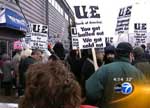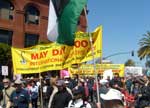
Chicago Plant Occupation Electrifies Labor
(December 2008).
click on photo for article

May Day Strike Against the War Shuts
Down
U.S. West Coast Ports
(May 2008)
click on photo for article
February 2012
Beaten Back, At a Cost

Grain
ship belonging to Korean shipper Pan Ocean
STX, part of EGT consortium, docked at
Longview
on February 7, where it was handled by ILWU
longshore workers. (Photo: Longview Daily News)
FEBRUARY 11 – The drive to break International Longshore and Warehouse Union (ILWU) jurisdiction on Pacific Coast grain shipping has been beaten back after months of explosive labor struggle. A multinational consortium, EGT, built and last July began operating a new $200 million grain terminal with scab labor. Now the scabs are out and ILWU workers are in.
Last week, EGT recognized the union as bargaining agent and on Thursday the membership of ILWU Local 21 approved a contract. But this has come at a cost. Although details are yet to be announced, it is clear that the union leadership made significant concessions in the bargaining. This could set the stage for future battles as other shippers demand similar terms.
The battle in the Columbia River port of Longview, Washington drew national attention as ILWU supporters repeatedly blocked trains and occupied the facility. Labor organizations in the Pacific Northwest and nationally declared their support. The Occupy movement twice shut down West Coast ports in solidarity with the embattled Longview longshore workers.
This class war on the waterfront reached a high point in the early morning hours of September 8 when some 800 dock workers from across the Pacific Northwest “stormed” the terminal, as the bosses’ press described it. Security guards took refuge in their shacks, the police turned tail, and according to media reports, over 100,000 tons of grain was dumped on the tracks (see “Showdown on the West Coast Docks: The Battle of Longview,” The Internationalist, 4 November 2011).
For the ILWU, Longview has been a make-or-break struggle against union-busting. If EGT were to breach the union’s jurisdiction on the docks, the other grain shippers would try to follow suit. Already they insisted on a one-year Northwest grain agreement, pending the outcome of the Longview dispute. But the union held fast, and the ruling class feared that unrest on the docks could spread.
The key fact is that members of Operating Engineers Local 701, who since last July had been daily crossing the picket lines of ILWU Local 21, are no longer working at EGT. They have been replaced by ILWU longshore workers, both on the docks and in the mill. Charges by EGT against the union have been dropped, although the union still faces over $300,000 in fines.
On Monday, January 23, as the U.S. Coast Guard declared a “safety zone” around the EGT terminal and protesters were demonstrating in Oakland and New York against the use of military in the service of union-busting, Washington governor Chris Gregoire announced that a “tentative agreement” on legal issues had been reached between EGT and the ILWU. The Longview Daily News (24 January) described the pact as a “ceasefire.”
A few days later, on January 27, the Port of Longview approved the settlement agreement. On February 1, Local 21 announced that an arbitrator had ruled that workers dispatched from the union hiring hall had selected the ILWU as their bargaining agent, which the company recognized. On February 7, the first ship arrived at the EGT terminal, where it was handled by ILWU workers. And on February 9, Local 21 voted to approve the contract. EGT CEO Larry Clarke was quoted as saying, “The five year agreement is unique on the West Coast and provides us the dedicated workforce and the flexibility to run this 21st century facility efficiently and safely.”
In a number of areas, the union agreed to terms EGT offered a year ago.
- The five-year contract means that the company will not abide by terms of the Northwest master grain contract. What exactly was agreed to provide EGT with the “flexibility” to run the terminal “efficiently” is not known at this time.
- A sticking point in earlier negotiations, which the union has now accepted, was EGT’s demand for 12-hour shifts, with no overtime pay until 40 hours. In the master contract overtime pay begins at the end of 8 hours, and includes all night work.
- A significant concession was the ILWU’s agreement that EGT was not bound by the Longview port working agreement stipulating that all waterside work be performed by ILWU members. This was dropped in a rewritten lease between the port and EGT.
- As an added sweetener, the amended lease says that the company will not be required to use union labor or comply with prevailing wages for construction. This legalizes EGT’s use of scab labor to build the plant.
- The union also agreed to a company demand that workers had to be from a pool “pre-qualified by EGT.” This is a significant weakening of the union hiring hall, allowing the company to select its workforce.
EGT stated that as a “business decision” it had decided to go through the Local 21 hall, but that decision could change. Moreover, the agreement says the hiring hall would have to dispatch workers without regard to union affiliation. This is a capitulation to the Taft-Hartley Act, which sought to outlaw union hiring halls, and which the ILWU successfully resisted in the past.
The agreement says nothing about the 220 arrests of longshore workers and supporters. As trials began, Longview juries acquitted a number of protesters of minor charges and some trespassing charges were dropped. But at least ten face felony counts, including “resisting arrest” for coming to the aid of women being maced and brutally manhandled by cops. Defenders of labor rights must demand that all charges against ILWU members and supporters be dropped.
Unlike most labor officialdom, which seldom gets out of its cushy chairs, the ILWU leadership was actually willing to take arrests in the course of the struggle, if only to keep a handle on the militant ranks, who had shown they were prepared do whatever it takes to defeat EGT. But after being hit with huge fines, and under tremendous pressure from the capitalist rulers, the ILWU tops took fright and tried desperately to put a clamp on militant struggle.
Action by the Occupy movement aided the Longview longshore struggle, despite the shameful attacks by the union bureaucracy which staked everything on backroom deals. The governor intervened due to concern about the “general turmoil throughout the southern part of Washington State” (in the words of the agreement) and its side effects elsewhere. She was reportedly worried that the unrest could spread to the Puget Sound ports.
The fact that the union-busting drive by EGT was beaten down means that longshore workers were able to avoid a major defeat. In contrast, public sector workers in Wisconsin had their bargaining rights taken away and suffered huge cuts because the union misleaders sold out the struggle to the Democrats. But the ILWU leadership’s opposition to a port shutdown, its backstabbing of Local 21 and hostility to Occupy solidarity prevented a stunning victory that could have spurred organizing of non-union workers, starting with the hard-pressed port truckers.
So ILWU workers are in the plant and the scabs are out. Credit for this is due to the militancy of Longview and other longshore workers and their supporters who would not be intimidated by the capitalist courts and cops. The showdown in Longview is a harbinger of sharp class battles to come. Key is to oust the bureaucrats and to build a workers party to fight for a workers government. We need to forge a class-struggle leadership of labor worthy of the courageous workers of Longview. ■